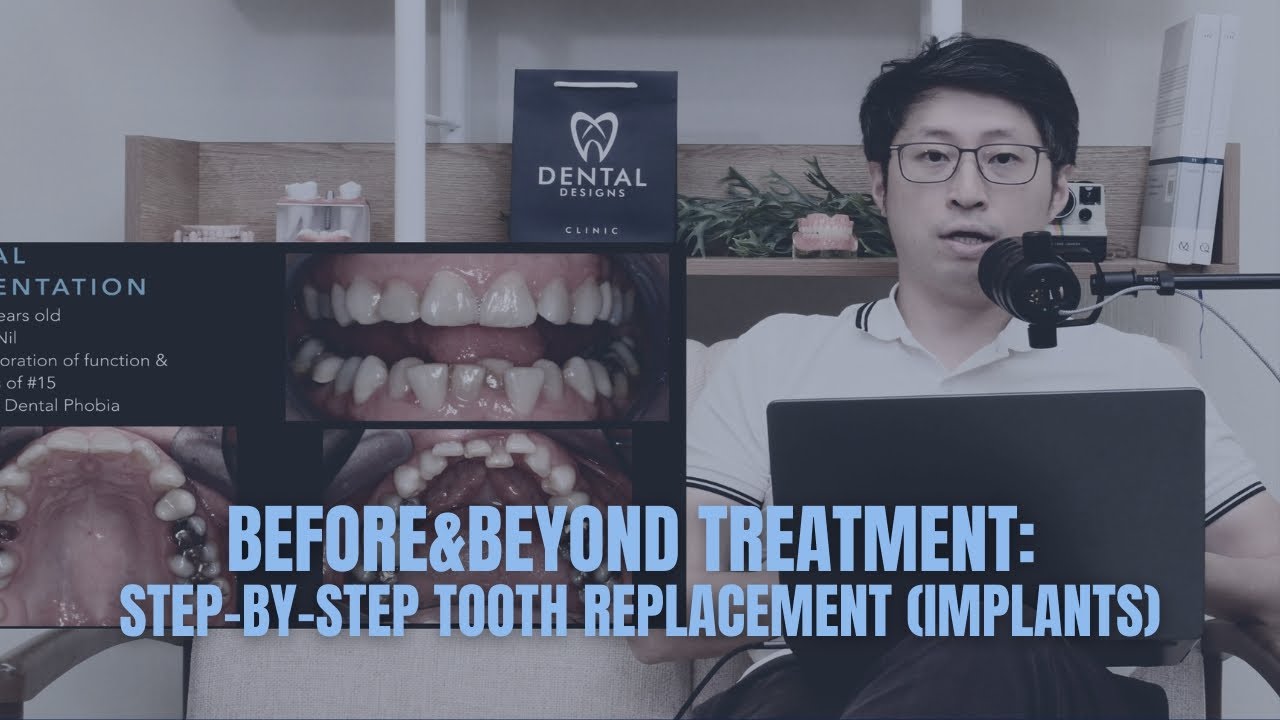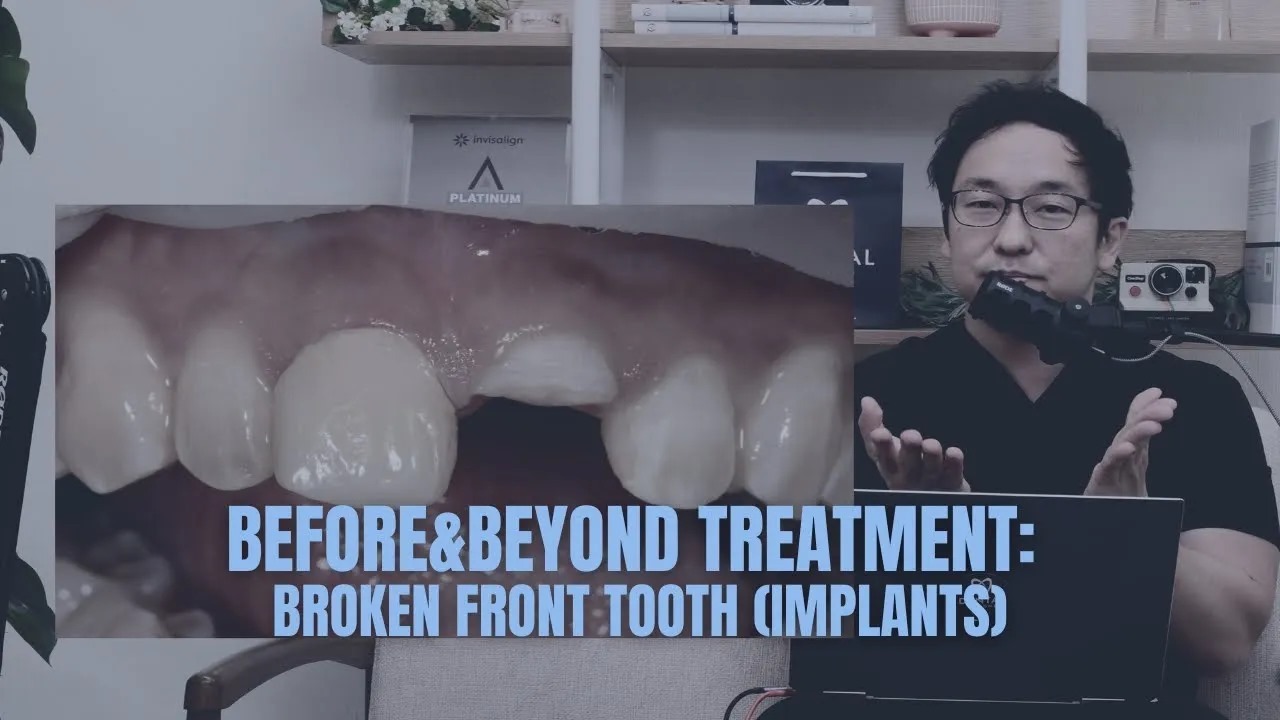Dental Implants
We source our dental implants from reputable European manufacturers renowned globally for their quality.
Reliable, Low-maintenance, with Natural appearances.
-2.png?width=600&height=600&name=Rotate%20-90%20degree%20(3)-2.png)
What Are Dental Implants?
Dental implants, also known as dental implant surgery, help replace tooth roots with sturdy metal posts and a life-like ceramic crown to restore missing teeth or damaged teeth.
Unlike other artificial teeth or replacement options, dental implants offer a level of function and sensation closest to that of natural teeth.
One of the key advantages of dental implants is their self-sufficiency. They are independent units that do not rely on neighbouring natural teeth for support, providing a strong and stable foundation for a beautiful smile.
At Dental Designs, we understand the importance of an initial dental implant consultation. It's a step towards your smile transformation, our dental surgeon assesses oral health and discusses treatment options. From dental implant surgery to surrounding bone grafting, we guide you through every step of the process.
Problems Caused By Gaps Between Teeth
Over many years when there is a space left, the following long term consequences usually occur:

1. Tipping of Adjacent Teeth
When a tooth is lost and not replaced promptly, the surrounding teeth may start to shift or tip into the space. This occurs because teeth rely on each other for support and stability. As adjacent teeth drift out of proper alignment, it can cause bite problems, misalignment and even jaw pain. Over time, this tipping of adjacent teeth can exacerbate dental issues, requiring extensive treatment to correct.
2. Over-eruption of Opposing Tooth
The opposing tooth may start to over-erupt or extrude into the gap. This happens as the opposing tooth seeks contact to bite, causing it to grow longer than its natural position. Over-eruption can disrupt the balance of your bite and may cause discomfort, difficulty chewing and potential damage to surrounding teeth and tissues.
3. Loss of Surrounding Tissues
Gaps between teeth can result in the loss of surrounding gum tissue and bone. Without the stimulation provided by the missing tooth root, the jawbone may begin to deteriorate over time, causing bone loss. As the supporting structures weaken, it becomes challenging to successfully restore the missing tooth and maintain oral health.
Benefits Of Having Dental Implants
-1.png?width=522&height=415&name=Group%20526%20(7)-1.png)
One of the primary benefits of dental implants is their ability to restore the full functionality of natural teeth. Unlike removable dentures, dental implants are anchored securely into the jawbone, providing stability and strength comparable to natural teeth. This allows individuals to chew and bite with confidence, enjoying a varied diet without limitations.
When a tooth is lost, the underlying jawbone may begin to deteriorate over time due to lack of stimulation. Dental implants mimic the natural tooth root, stimulating the jawbone and preventing bone loss. This helps maintain the integrity of the jawbone structure and facial contours, preserving overall oral health and aesthetics.
Dental implants are surgically embedded into the jawbone, providing a sturdy foundation for replacement teeth.
Whether it's a single tooth or multiple teeth, dental implants blend with existing teeth, ensuring a uniform pleasing appearance. With dental implants, not only is the functionality of teeth restored, but also the confidence in one's smile and overall well-being.
Unlike traditional dental bridges, which rely on adjacent teeth for support, dental implants are self-supporting and do not require the alteration of neighboring teeth. This preserves the integrity of adjacent teeth and prevents unnecessary wear and strain on healthy tooth structure. Dental implants promote overall oral health by keeping adjacent teeth stable and untouched.
Dental implants offer a significant improvement in overall quality of life for individuals with missing teeth. With restored oral function, and increased confidence, patients can enjoy a better quality of life and regain the ability to eat, speak, and smile with ease. Dental implants eliminate the discomfort and inconvenience associated with removable dentures, providing a permanent and reliable solution for tooth replacement.
With proper care and maintenance, dental implants can last for a lifetime. Made from durable materials such as titanium, dental implants are highly resilient and resistant to decay and deterioration. Unlike other tooth replacement options, dental implants offer a permanent solution that can withstand the test of time.
%201-1.png?width=564&height=563&name=Blue%20and%20Pink%20Soft%20Magazine%20Cover%20Mockup%20Instagram%20Post%20(6)%201-1.png)
Curious About Dental Implants in Singapore?
Grab our free dental implants Guidebook
Multiple Missing Teeth Affects Quality of Life
Losing a tooth can greatly impact daily life, affecting tasks like chewing and even causing unintended consequences.
Research shows that people tend to avoid using the side with the missing tooth, potentially harming the remaining teeth can make you take other teeth replacement options.
Furthermore, tooth loss can affect speech, self-confidence, and how others perceive you. It can also alter your smile's appearance and therefore a reluctance in displaying a full, symmetrical smile and affecting facial symmetry. Let us help you regain your smile!
Types of Dental Implant in Singapore

- A single implant is ideal for replacing a single missing tooth. This type of implant consists of a titanium fixture surgically inserted into the jawbone, which acts as an artificial tooth root.
- Once the implant integrates with the surrounding bone, an abutment is placed on top of the fixture, and a dental crown is attached.
- The result is a natural-looking and fully functional replacement tooth that seamlessly blends with your natural teeth.

- An implant retained bridge is a suitable option for replacing multiple missing teeth in a row.
- Instead of relying on adjacent teeth for support like traditional dental bridges, this type of bridge is supported by dental implants.
- The implants are strategically placed along the jawbone, and the bridge is securely attached to them.
- Implant-retained bridges offer stability and durability, restoring your ability to bite, chew, and speak with confidence.

- An implant overdenture is a removable prosthesis that is securely anchored to dental implants. This option is commonly used for patients who have lost all or most of their teeth in one or both arches.
- The dental implants provide stability and support for the overdenture, preventing it from slipping or shifting while eating or speaking.
- Implant overdentures offer improved comfort and function compared to traditional dentures, providing a more stable and secure solution for replacing missing teeth.

- The All-on-4 dental implant technique is a revolutionary solution for patients who are missing all or most of their teeth in one arch.
- With this approach, a full arch of artificial teeth is supported by just four strategically placed dental implants.
- This minimally invasive procedure eliminates the need for bone grafting in many cases and provides immediate function and aesthetics.
- All-on-4 dental implants offer a permanent and fixed solution for restoring a complete smile and improving oral function.
Types of Dental Implant in Singapore
- A single implant is ideal for replacing a single missing tooth. This type of implant consists of a titanium fixture surgically inserted into the jawbone, which acts as an artificial tooth root.
- Once the implant integrates with the surrounding bone, an abutment is placed on top of the fixture, and a dental crown is attached.
- The result is a natural-looking and fully functional replacement tooth that seamlessly blends with your natural teeth.
- An implant retained bridge is a suitable option for replacing multiple missing teeth in a row.
- Instead of relying on adjacent teeth for support like traditional dental bridges, this type of bridge is supported by dental implants.
- The implants are strategically placed along the jawbone, and the bridge is securely attached to them.
- Implant-retained bridges offer stability and durability, restoring your ability to bite, chew, and speak with confidence.
- An implant overdenture is a removable prosthesis that is securely anchored to dental implants. This option is commonly used for patients who have lost all or most of their teeth in one or both arches.
- The dental implants provide stability and support for the overdenture, preventing it from slipping or shifting while eating or speaking.
- Implant overdentures offer improved comfort and function compared to traditional dentures, providing a more stable and secure solution for replacing missing teeth.
- The All-on-4 dental implant technique is a revolutionary solution for patients who are missing all or most of their teeth in one arch.
- With this approach, a full arch of artificial teeth is supported by just four strategically placed dental implants.
- This minimally invasive procedure eliminates the need for bone grafting in many cases and provides immediate function and aesthetics.
- All-on-4 dental implants offer a permanent and fixed solution for restoring a complete smile and improving oral function.
How Are Dental Implants Different At
Dental Designs Clinic?
.png?width=61&height=61&name=image%20260%20(1).png)
Reputable implants from Europe
We only use implants backed with reputable long term studies and those that have a great track record. These implants are designed to integrate with your bone, providing a strong and durable foundation for your new teeth.
.png?width=61&height=61&name=image%20263%20(1).png)
In-house dental laboratory
An in-house lab helps speed up the dental implant process by making custom parts like crowns, stents, guides and abutments quickly and with great accuracy. Because the dentist and the lab technician work closely together, it also allows for better quality control.
.png?width=61&height=61&name=image%20262%20(1).png)
Careful planning around dental structures
We believe in preservation of what is remaining. Modern digital tools enable us to visualise your unique oral anatomy in detail so that we can plan treatments with precision, minimise risks, and achieve effective results while maintaining the health and integrity of your natural dental structures.

Experienced Dentists
Our dentists have undergone intensive implant training both locally and internationally to provide suitable treatments for you. They use the Fully Guided Implant Surgery technique, which ensures shorter surgery times, faster healing, and fewer complications compared to traditional implant surgery.

Fully digital workflow
From taking a 3D scan of your teeth to capturing accurate X-rays and using 3D printing technology to create custom-made solutions, we utilise modern dental technology to deliver treatment results.
.png?width=61&height=61&name=image%20263%20(2).png)
Comfortable clinic and conveniently located
Our clinic is designed with comfort in mind, for a relaxing and enjoyable visit. Relax in plush chairs, listen to soothing music, and enjoy ceiling-mounted TVs. We’re also conveniently located, easily accessible by car or MRT.
Fully Guided Keyhole Implant Surgery
Experience the benefits of our Fully Guided Keyhole Implant Surgery at Dental Designs Clinic. This technique minimises the size of the surgery site, resulting in fewer stitches, and quicker healing by considering the following factors:
1) Preserving Critical Anatomical Structures - Using 3D visualisation, our team ensures that nerves, sinus cavities, arteries, and other vital structures are carefully avoided during the procedure.
2) Optimising Quality and Quantity of Bone - Surrounding the implant with healthy, adequate bone is crucial for long-lasting success and stability.
3) Enhancing Quality and Quantity of Gum - We ensure that your implant is supported by sufficient healthy gums that are resilient enough to withstand potential damage.
4) Placement for an Aesthetic and Natural Result - Our experienced dentists meticulously position the implant to the future implant crown, ensuring easy cleaning and a natural-looking smile.
With good oral hygiene practices and regular check-ups, you can maintain the health of dental implants for years to come.
Take a step towards restoring your smile and oral health today.
Process Of Getting Dental Implants At
Dental Designs in Singapore
.png?width=370&height=341&name=Rectangle%2053%20(12).png)
1. Consultation
A detailed examination is conducted to determine oral health, discuss your treatment goals, and address any concerns you may have about the dental implant procedure – this process includes taking digital 3D images and X-ray scans.
This consultation session also helps us determine if the bone is sufficient for an implant, as otherwise a sinus lift, or bone grafting may be required.
If there is a reason that you are unsuitable for dental implants, our dentists will work closely with you to explore other dental aesthetic options to achieve your desired results.
.png?width=370&height=341&name=Rectangle%2053%20(13).png)
2. Checking The Implant Site
Before proceeding with dental implant placement, we will evaluate the implant site to ensure optimal conditions for successful integration. This may involve various steps such as:
A Tooth Extraction may be required for any teeth that are damaged beyond repair at the implant site. This may be performed before the implant procedure, or in some cases, at the same visit.
A Sinus Lift may be required to support dental implants by lifting the sinus membrane and packing bone powder into the area. In cases where the sinus cavities are too close to the implant site in the upper jaw, a sinus lift procedure may be necessary.
A Bone Graft may be required if jaw bone is insufficient to support the implant, it may be recommended to augment the bone volume and density.
A Gum Graft gum tissue may need to be augmented to ensure adequate support and coverage around the implant site.
.png?width=370&height=341&name=Rectangle%2053%20(14).png)
3. 3D Guided Surgery
At our clinic, we use the power of technology to provide you with an implant surgery experience that is not only safe but accurate. We plan the placement of the dental implant to ensure optimal positioning and stability.
By integrating 3D Intra-oral models and cone-beam CT x-rays, our implant dentist works closely together with our in-house lab to meticulously plan the exact positioning of your implant, ensuring precision and avoiding any potential risks to vital structures such as the jaw nerve and arteries.
This technology allows for accurate implant placement, minimising the risk of complications and ensuring predictable outcomes.

4. Placement Of Implant
At Dental Designs, our in-house lab creates a surgical guide that allows us to perform Fully Guided Keyhole Implant Surgery.
Once the implant site is prepared, the dental implant fixture, typically made of titanium, is surgically inserted into the jaw bone. This implant serves as a replacement for the root of the missing tooth and provides a stable foundation for the artificial tooth.
This approach results in reduced pain, fewer stitches, and expedited healing. The procedure usually takes 1-2 hours per implant and is performed under local anaesthetic, ensuring you are comfortable throughout.
After your implant has been placed, it is important to allow time for the site to heal, and your implant to integrate with your jaw bone. This process usually takes up to 3 months.

5. Crown Installation
Once your tissues have healed, and your implant is securely fused to the jawbone (osseointegration), we can then start to take scans to fabricate the crown for your implant abutment.
We take pride in crafting all crowns in our in-house lab to ensure a seamless fit and enhance your chewing comfort. Once your crown is prepared, it will be secured to your implant, marking the completion of treatment and allowing you to confidently walk away with your new tooth.

6. Review Check
Following the placement of the dental implant and crown, we will schedule periodic review checks to monitor your progress and ensure the success of the treatment.
We recommend to follow up with you dentist for a review 2 weeks later to check on the fit and stability of your implant.
We will guide oral hygiene practices and offer any necessary post-operative care instructions to promote optimal healing and long-term implant success.
At a minimum, we recommend that all dental implant patients attend a 6 monthly check up appointment. Implants are very strong but rely on good maintenance of the gum for support. Should a problem arise, success rates are much higher when caught early.
If cared for correctly, implants can last for many years. They are the closest replica to your natural teeth, so do make the effort to care for them!
Treatment Review by Doctors
Discover how our doctors use laser treatment to manage gummy smiles in real patient cases.
Cost of Dental Implants in Singapore
We do more than just enhance your smile. When it comes to dental implants, we're here to help you fill in any gaps in a natural way and also make everyday things like eating and talking so much easier for you.
Through diagnostics, including 3D jaw and teeth imaging and professional photographic assessments, we ensure that your dental implant procedure is customised to meet your specific needs, balancing both aesthetic and functional outcomes.
Starts From
$3,270*
| 3D CBCT | $337.90 |
| Guided Implant Stent, Per Implant | $545 - $599.50 |
| Dental Implant Surgery (Front Tooth (MediSave Claimable $1,950) | $3,815 - 4,196.50 |
| Dental Implant Surgery, Back Tooth (MediSave Claimable $1,950) | $3,270 - 3,597 |
| Implant Crown, Front Tooth | $2,834 - 3,297.25 |
| Implant Crown, Back Tooth | $2,180 - 3,297.25 |
*Price are inclusive of 9% GST
**Medisave claimable max $1,950 per Dental Implant Surgery
***For complex cases, additional treatment will be required and charged separately

Dental Implant Warranty
A 10 year warranty applies if the entire procedure was done at our clinic, including the bone grafting, implant placement and crown.
Creating Smiles, Changing Lives
Over 28 reviews
The service and doctor is the best in town! The customer service and receptionists are very friendly! Dr Phillip Miller and Dr Noah Teo is very nice and very professional on their skill! They also very patient to explain to me about the treatment!
Will come back again!
Thank you very much!
李岳侨
J. Kho
This dental clinic has very good staff who are well trained and friendly. The dentists are also very good and will explain the treatment in detail before starting treatment. The equipment is very high tech and I believe they are able to do high quality work as I did my crown here and it looks much better than my colleague who also recently did his at another place. The waiting room is also very comfortable. good job!
C. Zheng De
This clinic is one of the best I have ever seen. I saw dr Justin for my implant which I did many years ago, the tooth was loose, and other drs told me to remove it as they could not find out what brand it was but dr Justin was able to take 3d xrays and locate the brand and specially ordered the part in. he saved me from having to do a surgery to remove and put a new implant which would have cost me a bomb. the tooth looks even better than the original thanks to the experieced dental technician Katsuya from Japan.
Very happy and will keep coming back for my regular dental.
G. Hock An
my workplace is close by and I had a problem with my tooth for a few days, so I made an appointment to come down. The receptionist who booked my appointment was very helpful and friendly to explain the way to the clinic from my office. I saw Dr Nicholas who was able to do a root canal treatment on the same visit so that I didn't need to come back. I felt safe and comfortable to do my dental treatment here as the dental picks are all wrapped up and sterilized and only opened before each treatment when im inside.
P. Wendy
Hear From Our Happy Patients
The service and doctor is the best in town! The customer service and receptionists are very friendly! Dr Phillip Miller and Dr Noah Teo is very nice and very professional on their skill! They also very patient to explain to me about the treatment!
Will come back again!
Thank you very much!
李岳侨
J. Kho
This dental clinic has very good staff who are well trained and friendly. The dentists are also very good and will explain the treatment in detail before starting treatment. The equipment is very high tech and I believe they are able to do high quality work as I did my crown here and it looks much better than my colleague who also recently did his at another place. The waiting room is also very comfortable. good job!
C. Zheng De
This clinic is one of the best I have ever seen. I saw dr Justin for my implant which I did many years ago, the tooth was loose, and other drs told me to remove it as they could not find out what brand it was but dr Justin was able to take 3d xrays and locate the brand and specially ordered the part in. he saved me from having to do a surgery to remove and put a new implant which would have cost me a bomb. the tooth looks even better than the original thanks to the experieced dental technician Katsuya from Japan.
Very happy and will keep coming back for my regular dental.
G. Hock An
my workplace is close by and I had a problem with my tooth for a few days, so I made an appointment to come down. The receptionist who booked my appointment was very helpful and friendly to explain the way to the clinic from my office. I saw Dr Nicholas who was able to do a root canal treatment on the same visit so that I didn't need to come back. I felt safe and comfortable to do my dental treatment here as the dental picks are all wrapped up and sterilized and only opened before each treatment when im inside.
P. Wendy
Google Rating
Based on 1000+ Google reviews
Frequently Asked Questions About Dental Implants In Singapore
A dental implant is not a complete tooth but rather a crucial component used to replace missing teeth. It consists of three essential parts:
-
The Dental Implant: This is a small titanium post or fixture surgically inserted into the jawbone. It serves as the artificial tooth root.
-
The Abutment Connector: Once the implant has integrated with the bone, an abutment is attached to it. The abutment acts as a connector between the implant and the artificial tooth.
-
The Artificial Tooth/Teeth: The final part is the artificial tooth or teeth, which are securely attached to the abutment. These artificial teeth are meticulously crafted to resemble natural teeth in both appearance and function.
Together, these components form what is commonly referred to as an "implant tooth," offering a durable and aesthetically pleasing solution for missing teeth.
Basically, if you are healthy enough to have a tooth taken out, you are probably healthy enough to have a dental implant placed.
Patients are usually concerned about being too old for the procedure. There is no maximum age limit to who can receive a dental implant as the implant will still work regardless of age.
However, there is a minimum age limit. Patients who are still growing (Eg. Children or teenagers) will usually need to delay the dental implant procedure until growth is complete.
Patients with the following conditions must be carefully evaluated:
- Uncontrolled diabetes
- Steroid therapy
- Connective tissue disorders
- Bone disorders
If you have these conditions, implants may still be possible, albeit with a higher chance of complications. Please consult your dentist for more information.
Most people find dental implant surgery very easy to tolerate, and in fact most people report that it is less painful than the tooth extraction.
Local Anaesthetics will be administered during the surgery to ensure you are comfortable at all times. If you are particularly nervous, you may discuss sedation options with your dentist as well.
Any post-operative discomfort can usually be managed with over-the-counter anti-inflammatory medication. Ice packs to ease any swelling can also be helpful.
Dental implants have an approximate success rate of 98%. However, keep in mind that taking care of your implant is necessary to ensure that the implant lasts a long time.
Success rates also depend on many other factors, such as where the implant is installed in the jaw, how well the patient maintains overall oral hygiene, and the medical status of the patient.
No other tooth replacement provides stimulation to the supporting jawbone. Usually, that stimulation comes from the tooth’s root. The implant screw replaces that tooth root, stimulating the supporting bone and preventing long-term deterioration of the supporting bone structure. Also, because an implant is permanently attached to the jawbone, it will not slip or shift such as with other tooth replacement options, such as dentures.
The healing process differs for each patient, as no two implant procedures are identical. Some patients require a bone graft prior to implant placement, while others opt for a same-day implant treatment. Most patients can expect some soreness for the first few days after the dental implant surgery, which typically goes away within 1-2 weeks. There is a three to six month waiting period, during which time the metal implant fuses with the jawbone. Once integration is complete, a dental crown can be placed and the implant can now be used for chewing.
Dental implants can last a patient a lifetime if they’re well taken care of. Implants do not decay. Dental Implants are supported by the surrounding bone and gums which are still susceptible to bacteria. Implants should be cared for similar to a natural tooth. This includes good home dental care, regular dental exams and professional cleaning.
Dental implants require multiple office visits as there is a planning process as well as a waiting period between each stage. It takes time for the implant to fuse to the bone before the final crown can be placed. Between the start of the procedure and completion, it can take a few months.
At the outset, implants are more expensive than other tooth-replacement methods such as dentures or bridgework. But they also last many years longer and in fact should never need replacement, unlike dentures. So they are a viable option when viewed as a long-term investment in your health, quality of life, comfort and well-being.
Tooth implants in Singapore vary in cost around $2000 to $8000 or more per tooth. The price of a dental tooth implant may vary depending on a variety of factors, such as the services or treatments that come with getting a dental implant.
Certain services like bone augmentation, soft tissue treatment, extraction, and crowning will all affect the overall price of getting a dental implant.
If you have Medisave, we can assist you to claim a portion of the cost from Medisave.
- Effect Of Implant Design on Survival and Success Rates Of Titanium Oral Implants: a 10‐year Prospective Cohort Study Of the Iti® Dental Implant System Ioannis
Karoussis – Urs Brägger-Giovanni Salvi-Walter Bürgin-Niklaus Lang – Onlinelibrary.wiley.com/doi/abs/10.1111/j.1600-0501.2004.00983.x - Influence Of Diameter and Length Of Implant on Early Dental Implant Failure
Sergio Olate-Mariana Lyrio-Márcio Moraes-Renato Mazzonetto-Roger Moreira – Sciencedirect.com/science/article/pii/S0278239109019326 - Integrating Three-dimensional Digital Technologies For Comprehensive Implant Dentistry
Neal Patel – Ncbi.nlm.nih.gov/pubmed/20516111 - Cad / Cam Dental Systems in Implant Dentistry:
Update M Fuster-Torres-Salvador Albalat-Estela-Mariano Alcañiz-Raya-María Peñarrocha-Diago – Ncbi.nlm.nih.gov/pubmed/19242395 - Long-term Survival and Success Of Oral Implants in the Treatment Of Full and Partial Arches: a 7-year Prospective Study with the Iti Dental Implant System
Eugenio Romeo-Diego Lops-Emilio Margutti-Marco Ghisolfi-Matteo Chiapasco-Giorgio Vogel – Ncbi.nlm.nih.gov/pubmed/15101597 - Risk Factors For Dental Implant Failure: A Strategy For the Analysis Of Clustered Failure-time Observations
S.k. Chuang, L.j. Wei, C.w. Douglass, T.b. Dodson, 2002 S.K. Chuang-L.J. Wei-C.W. Douglass-T.B. Dodson – https://journals.sagepub.com/doi/abs/10.1177/154405910208100814
Get in Touch
We’d love to hear from you!
Schedule Appointment
Directly with our Online Booking Form









